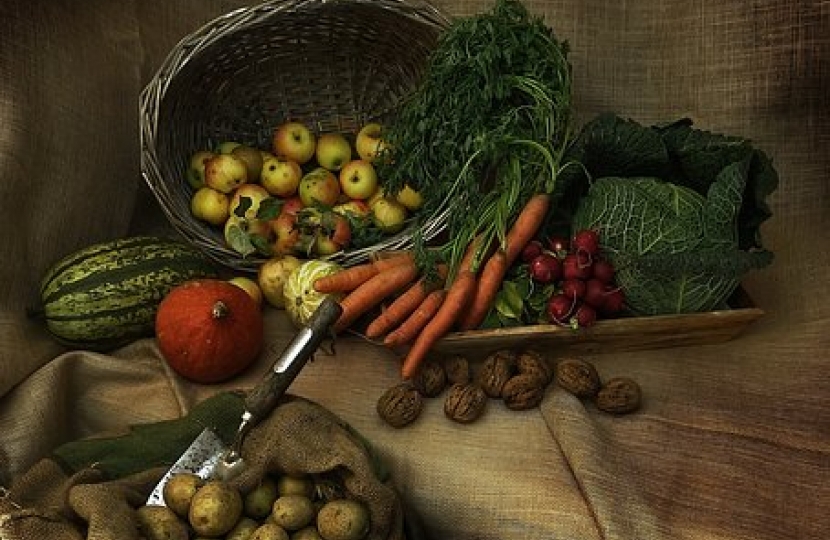
Anthony Browne MP is MP for South Cambridgeshire, and is Chairman of the All Party Parliamentary Group on the Environment.
Would you support a law that could ban imports of tea, coffee and bananas into the UK, devastating many of the world’s poorest economies – and people? Or that effectively bans food imports from developed nations which have a trade deal with us – but allows them from those that don’t?
No, I didn’t think so.
But that would be the impact of last week’s House of Lords well-intentioned but ill thought-out amendment to the Agriculture Bill, coming to the Commons tomorrow, which insists that agricultural imports under any trade deal would have to be produced to the UK’s environmental protection, animal welfare, food safety and plant health standards.
Making sure we don’t allow trade deals to undermine our environmental and animal welfare standards is an issue I passionately support, to the extent I made it the thrust of my maiden speech. I have been environment correspondent of two national newspapers, and am chair of the APPG on the Environment.
I have a rural constituency, and like most MPs, my inbox is flooded with demands – many prompted by Jamie Oliver’s campaigners – that I support this amendment. The Conservative Manifesto is also committed to ensuring trade deals don’t undermine our animal welfare, food safety and environmental standards. I know that the overwhelming majority of my colleagues support this aim.
The amendment sounds entirely reasonable, but its consequences could be utterly unreasonable. It is based on very solid principles which we can all support – but simply legislating for good principles rarely makes for good law.
Even its supporters should accept from the outset that this law is not a preservation of our current standards on imports, but a dramatic raising of them. It creates a potentially vast set of new conditions, which do not exist under any existing EU or UK agreement.
It would be extremely unlikely that trading partners would agree to all requirements; in some cases, it might not even be possible for them to do so. The EU is instinctively protectionist, but even it does not require that all imports have to precisely meet our environmental and animal welfare standards. Do campaigners think EU standards are unacceptably low?
We import bananas from many countries including the Dominican Republic, Belize and Cameroon. We import coffee from Indonesia, Ghana and Vietnam and black tea from Kenya. We do all this under existing (EU) rules.
But this amendment would require all these countries to have processes in place to show that they meet thousands of pages of UK domestic environmental and animal welfare legislation. The cost would be prohibitive and also unnecessary: I can tell you for free that they do not meet the carbon emission targets of the Climate Change Act that are now UK law. If we pass this amendment, pretty much all food imports would be banned from pretty much all developing countries if we signed a trade deal with them.
Developed nations can better afford to provide the evidence that they meet UK standards, but many of them are seriously inappropriate. Our geography and climate mean that we need strict legal controls on nitrate concentration in soils, which are inappropriate for other countries. We have laws (to protect nesting birds) on what time of year farmers are allowed to cut hedges, which would be completely wrong-headed to impose on producers with different eco-systems.
Campaigners would take cases to court to decide what imports are allowed. We were the first major economy in the world to legislate for Net Zero by 2050. Do we ban all agricultural imports from countries without those legal targets? There is a contradiction between us wanting to be world-leading on environmental standards, and then insisting we will only trade with those who have the same standards.
There is also the bizarre unintended consequence that the amendment only applies to trade where there is a free trade agreement. So we could import coffee from Vietnam if we have don’t have a trade agreement, but if we do have a trade agreement we would have to ban coffee imports. Our trade deals would become anti-trade deals.
Like the EU, we should be pragmatic. The detail is so complex, we can’t tie the hands of our trade negotiators with blunt legislation, but rather we should examine in detail whether we support what they are proposing.
That is why the government has agreed with campaigners to set up an independent Trade and Agriculture Commission to advise on how best the UK can seize new export opportunities, while ensuring animal welfare and environmental standards in food production are not undermined. I think there are strong arguments to make this commission permanent to scrutinise future trade deals. If you don’t trust the assurances of ministers, Parliament already has the power to reject any trade deal that it does not like.
Debate on this issue often ends up focused on the US’s chlorinated chicken. But there is already a UK law banning any product other than potable water from being used to decontaminate meat. Whatever is agreed in any trade deal, chlorinated chicken could only be sold in the UK if Parliament passes legislation allowing it. As Sir Humphrey would say: that would be very brave.
The overwhelming weight of political opinion is against us lowering our standards. We need to keep the same high standards on food and agriculture imports as we had in the EU. And that is exactly what the Government is doing.

